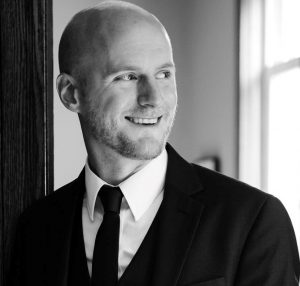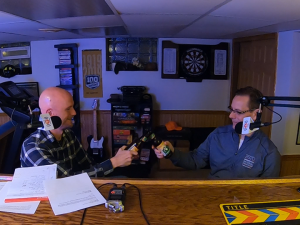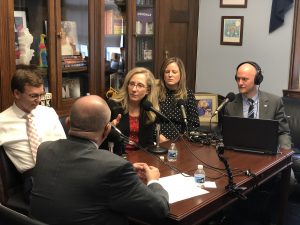
Name: Dusty Weis
Title and Organization: President & Founder, Podcamp Media
Graduation Year and Degree: 2007 BA in Journalism (Reporting) and Communication Arts (Radio/TV/Film)
Dusty Weis is the host and executive producer of Lead Balloon, a podcast that “explores tales of PR disasters, communications crises and half-baked marketing campaigns gone awry, giving communications professionals a platform to re-live the most pivotal moments of their careers.” Recently, Adweek named Lead Balloon as the 2020 Marketing Podcast of the Year. We caught up with Dusty to hear more about the award.
When it comes to your podcast and this award, what makes you the most proud?
We have a failure problem in the worlds of PR and marketing. The concept of “failure” has become very stigmatized in our line of work, to the point where conventional wisdom is that it’s usually better to embrace the status quo than to take a calculated risk and try something new.
That’s not a universal axiom, but it’s certainly apparent in the world of marketing podcasts, where 99 percent of shows follow the exact same “thought leadership” format. The first people to produce shows in this genre found a formula that works, and just about everyone who’s followed has emulated that blueprint.
So when I launched the Lead Balloon podcast, I wanted to produce a show that was entirely different, using immersive audio storytelling as a platform to celebrate the lessons learned from failures, mistakes and crisis moments in the fields of public relations and marketing. It’s sort of like “This American Life,” but for communications professionals who want some informal group therapy.
As Jedi Master Yoda once said, “The best teacher, failure is.” In my years of working in the field of communications, I’ve heard seasoned professionals revisit these old “war stories” with one another regularly in the office or at social gatherings, and I wanted to recreate that experience as a podcast.

To my knowledge, such a podcast had never been attempted before, but I wanted to try it. Being selected as AdWeek’s “Marketing Podcast of the Year” was a gratifying moment where I could take a deep breath and say, “Holy cow. Maybe I’m onto something here. All these hours hunched over a microphone or an editing computer are paying off.”
I took a big risk when I launched Podcamp Media, where we provide branded podcast production services for businesses. I quit a really good content marketing job with a well-respected national organization to bootstrap this company.
And I took that risk predicated on three notions: that brands have compelling stories to tell, that podcasts can and should be produced at the highest-possible level of quality, and that the key to success in the podcasting space is to do something original, serving a niche audience in a way that they haven’t been served before.
I’m grateful and proud that this recognition from AdWeek seems to confirm those notions. And, as I onboard my first full time employee and bring a project online for my first Fortune 500 client, I’m excited about what the future holds.
What’s the best advice you have for a J-School student who wants to do what you do?
You need to be creating something every day. I say this to every journalism and mass communications class to which I speak.
Get involved with a student media organization. Write a blog. Produce videos for YouTube and podcasts for your friends.
It doesn’t matter what you make right now, as long as you’re making something. When the time comes to go out into the working world, you need to be able to demonstrate to potential employers that you have deep and broad experience translating ideas into coherent stories across a wide array of different media.

When I was in journalism school, there were people who talked about which “platform” was going to “win.” Not even 15 years later, that seems like an appropriately silly notion.
The best job candidates in today’s market are strong writers who can produce audio and video, have an in-depth understanding of web and SEO, are social media natives, are comfortable telling a story on their own or as part of a team, and are adaptable enough to learn new things on the fly. It’s good to specialize in something, but eschewing one or more of these topics creates a blind spot that is almost certain to be seen as a weakness. Most important in today’s mediascape is an understanding of how best to tell a story using whatever combination of media is most suited to the audience in question. Platforms are irrelevant. There are just media in 2020.
The J-School is an incredible opportunity because you can learn all of these skills in an environment that is instructive yet playful, from field-tested experts, surrounded by peers who are just as talented, intelligent, driven and passionate as you are. Students may not realize this yet, but that sort of environment is rare in the “real world.” Cherish it, and make the most of it.
What is your favorite J-School memory?
I wish I could travel back in time, pop into some of my J-School labs, and go from person to person, telling them about the incredible things they would accomplish in just a few short years.
Two years after I graduated, I was a radio news reporter working in Madison. One of the competing reporters on the City Hall beat with me was a J-school classmate with whom I continued our friendly grammar rivalry. The spokeswoman for the Mayor’s office was a J-School classmate. The assignment desk editor for a local TV station and a couple TV reporters? J-Schoolers. Comms staffer at a major political rally I covered? CNN producer I bumped into at that rally? You get the idea.
When I got out into the world of media and communications, I found it was full of people with whom I already knew how to work… because I had already worked with a lot of them in J-School.
And now that I’m in a position to hire people to work for my business, my first hire is someone with whom I already worked 15 years ago at WSUM, while I was in J-School. When I’m presented with the opportunity to hire other J-School graduates, from any graduating class, that predilection for collaborative hard work and hands-on experience will jump them straight to the top of my pile.
The personal and professional relationships that are forged in J-School follow you for the rest of your life. And getting to work with such talented people before they became “big shots” is a gift I’ll never stop enjoying.
To learn more, follow Dusty on Twitter @dustyweis, or visit podcampmedia.com.